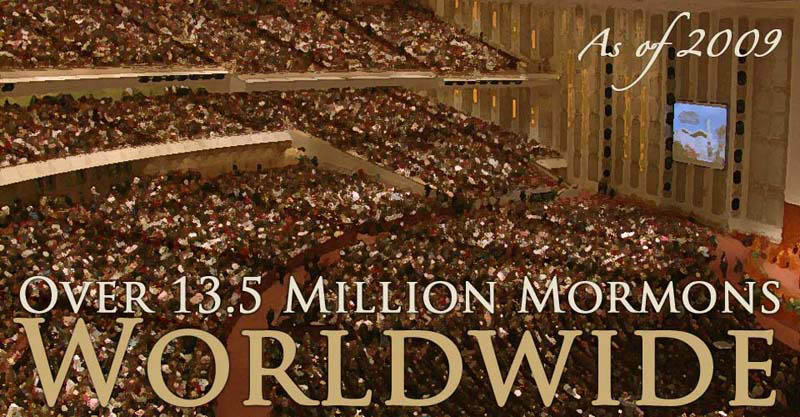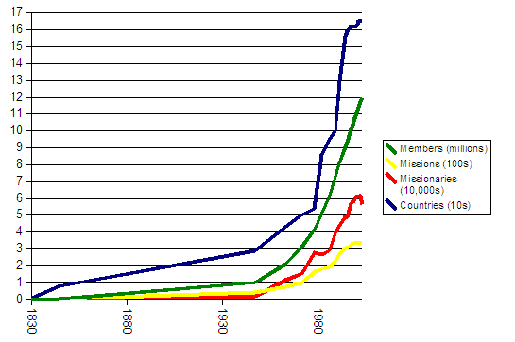Difference between revisions of "Church growth"
| Line 1: | Line 1: | ||
| − | [[image: Conference-center-Mormon.jpg|450px|right|alt=Mormon Conference Center| | + | [[image: Conference-center-Mormon.jpg|450px|right|alt=Mormon Conference Center|frame|As of end 2010, there were 14,131,467 Mormons Worldwide]]Worldwide, there were over 14,100,000 [[Mormons]] at the end of 2010, about the same as the number of [[Jews]]. [http://www.mormontimes.com/article/19452/14-million-Mormons-and-counting] |
In North America the [[LDS]] Church is the 4th largest individual denomination with over 6 million members, a population about equal to the number of [[Muslims]]. The Church had a healthy growth rate in the United States of 1.74% during 2006, and 1.42% in 2010 (while 1.5 million North Americans ceased to worship at any church in 2010). (To see comparative sizes of the 25 largest U.S. churches, go to the National Council of Churches website [http://www.ncccusa.org/news/060330yearbook1.html]) During 2010, the [[Mormon Church]] was one of only four religions in America to experience growth. | In North America the [[LDS]] Church is the 4th largest individual denomination with over 6 million members, a population about equal to the number of [[Muslims]]. The Church had a healthy growth rate in the United States of 1.74% during 2006, and 1.42% in 2010 (while 1.5 million North Americans ceased to worship at any church in 2010). (To see comparative sizes of the 25 largest U.S. churches, go to the National Council of Churches website [http://www.ncccusa.org/news/060330yearbook1.html]) During 2010, the [[Mormon Church]] was one of only four religions in America to experience growth. | ||
Revision as of 15:04, 13 April 2011
Worldwide, there were over 14,100,000 Mormons at the end of 2010, about the same as the number of Jews. [1]In North America the LDS Church is the 4th largest individual denomination with over 6 million members, a population about equal to the number of Muslims. The Church had a healthy growth rate in the United States of 1.74% during 2006, and 1.42% in 2010 (while 1.5 million North Americans ceased to worship at any church in 2010). (To see comparative sizes of the 25 largest U.S. churches, go to the National Council of Churches website [2]) During 2010, the Mormon Church was one of only four religions in America to experience growth.
Only 12% of all Mormons live in Utah. Most Mormons do not live in North America.
Aside from the United States, other regions with significant Mormon populations include Mexico and Asia (1 million members each), South America (3 million members), and Central America and Europe (about half a million each). The rapid growth the Church has been experiencing in Africa, where there are already a quarter of a million members, is particularly exciting.
After the Catholic Church, the LDS Church is the largest sect in ten U.S. states.
Contents
Religious Alliances
One way to classify religions is by grouping them into religious alliances. Religious alliances include those churches with central leadership and doctrinal uniformity (e.g. the Catholic Church) as well as those that lack central leadership. An example of the latter type is the “Assembly of God alliance,” which is comprised of many churches that are generally classified together even though each congregation has autonomy to teach as it pleases.
The LDS Church is the 15th largest religious alliance in the world and the 8th largest international religious alliance.
Religious Bodies
When one considers only religious bodies, i.e. those religions with central leadership and doctrinal unity...
The LDS Church is the 9th largest religious body in the world and the 4th largest international religious body.
(Note that for some religions, particularly the Eastern Orthodox Church, classification as a unified religious body was hard to determine.)
Ubiquity
It is also interesting to consider those religions that are the most ubiquitous (meaning most likely to have a meeting place "near you").
The LDS Church is the 5th most ubiquitous religious alliance in the world and the 4th most ubiquitous religious body.
Worldwide Statistics
LDS Worldwide Statistics (2004)[3]: Tonga: 46.0%. Samoa: 36.0%. American Samoa: 24.1%. Niue: 12.0%. Kiribati: 10.7%. Tahiti: 7.8%. Cook Islands: 8.3%. Marshall Islands: 7.0%. Chile: 3.3%. Palau: 2.1%. USA: 1.9%. Uruguay: 2.5%. New Zealand: 2.35%. Guatemala: 1.34%. Honduras: 1.6%. Bolivia: 1.6%. Ecuador: 1.2%. Peru: 1.4%. Belize: 1.0%.
Approximate, as of end 2010:
USA: 6,145,000.
Mexico: 1,235,000.
Brazil: 1,139,000.
Chile: 564,000.
Philippines: 646,000.
Peru: 494,000.
Argentina: 389,000.
United Kingdom: 187,000.
Guatemala: 226,000
Canada: 182,000.
Nigeria: 98,000.
Worldwide, there are over 28,000 LDS congregations, and the basic Church curriculum text is available in over 175 languages. The Church creates about two new congregations every day.
The majority of Mormons worldwide (55%) are not Caucasian.
There are estimated to be between 350,000 and 500,000 members of the Church with African heritage, though exact numbers are unknown because the Church does not keep track of the race of its members. Over 150,000 live in Africa, 10,000 (or more) in Brazil, 20,000 in the Caribbean, and perhaps as many as 50,000 in the U.S.
70% of Mormons worldwide were not born into the faith.
U.S. Statistics
LDS U.S. Statistics (2006):
Utah: 71.76%. (11/2007 news reports in Utah declare a new low of 60.7%) [4] Idaho: 27%. Wyoming: 11%. Nevada: 7.1%. Arizona: 6.0%. Montana: 4.6%. Hawaii: 5.1%. Oregon: 4.0%. Washington: 3.9%. Alaska: 4.2%.
The following statistics are from 2010 [5]: Utah: 1,910,343. California: 763,370. Idaho: 414,182. Arizona: 387,950. Washington: 267,927. Texas: 296,141. Oregon: 147,965. Nevada: 175,149. Colorado: 142,473. Florida: 136,549.
Some surveys suggest that the LDS Church has the highest U.S. attendance and service rates.
Growth Rate
The growth of the LDS Church is among the fastest of any denomination on the planet.
In the last 50 years, membership has increased ten-fold.
For the last 15 years, an average of 800 people have joined the LDS Church every day.
Absolute growth is greatest in Latin America, but the rate of growth is highest in Africa and the former Soviet bloc. East Asia also has a high conversion rate.
In 1984, a prominent non-LDS researcher estimated that our membership would top 265 million by 2080 and said we would be the “first 'new' major world religion since Islam.” So far growth has exceeded his model's predictions. [6]
See Also
External Links
For sources, see AllAboutMormons.com.

